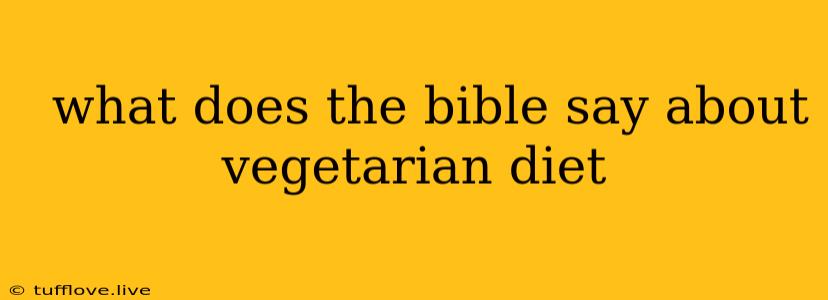The question of whether or not a vegetarian diet aligns with biblical teachings is a complex one, with diverse interpretations and perspectives across various denominations and theological schools. While the Bible doesn't explicitly mandate a vegetarian lifestyle, it does offer insights into dietary practices, ethical considerations, and the relationship between humans and the natural world that can inform a contemporary understanding of vegetarianism. Examining these passages and themes can provide a nuanced and balanced exploration of the biblical perspective on vegetarianism.
The Biblical Landscape: Insights and Interpretations
The Bible contains a rich tapestry of dietary regulations, stories, and ethical teachings that can be interpreted in various ways regarding vegetarianism. Some key passages often cited in discussions about biblical perspectives on vegetarianism include:
Genesis 1:29
"And God said, 'See, I have given you every plant yielding seed that is on the face of all the earth, and every tree with seed in its fruit; you shall have them for food.'" (NIV)
This passage from Genesis, often referred to as the "original diet," suggests that God initially intended for humans to subsist on plants. This interpretation is often used to support a vegetarian diet, suggesting that humans were created to live in harmony with the natural world and abstain from consuming animal life.
Genesis 9:3
"Every moving thing that lives shall be food for you. And just as I gave you the green plants, I now give you everything." (NIV)
Following the flood, God grants humans permission to consume both plants and animals. This passage is sometimes interpreted as a shift in God's dietary guidelines, allowing for the consumption of meat after the flood. However, some argue that it merely acknowledges the reality of the world after the flood, where animals are now a potential food source, without necessarily endorsing their consumption.
Leviticus 11
This chapter outlines detailed laws regarding clean and unclean animals. These laws are often seen as a system of dietary regulations for the Israelites, emphasizing ritual purity rather than strictly prohibiting the consumption of all animals. However, the inclusion of specific animals deemed unclean, such as pigs and shellfish, can be interpreted as an indication of God's preference for certain types of foods.
Isaiah 11:6-9
"The wolf will live with the lamb, the leopard will lie down with the goat, the calf and the young lion and the fatling together; and a little child will lead them. The cow will feed with the bear, their young will lie down together, and the lion will eat straw like the ox. The nursing infant will play over the hole of the cobra, and the weaned child will put its hand on the viper's den. They will not hurt or destroy on all my holy mountain, for the earth will be full of the knowledge of the Lord as the waters cover the sea." (NIV)
This passage paints a picture of a future world where humans and animals live in perfect harmony. Some interpret this as a utopian vision where violence and predation, including the consumption of animals, will be eliminated. This interpretation resonates with contemporary ethical vegetarianism, emphasizing the interconnectedness of all living beings.
Ethical Considerations and Environmental Impact
The Bible emphasizes compassion, justice, and the sacredness of all life, principles that can resonate with the ethical concerns of vegetarians. The Golden Rule, "Do unto others as you would have them do unto you," can be applied to our treatment of animals, leading some to question the ethics of consuming sentient beings.
Furthermore, concerns about the environmental impact of animal agriculture, including deforestation, greenhouse gas emissions, and water pollution, are increasingly relevant in a world facing climate change. The Bible's emphasis on stewardship of creation and preserving the Earth for future generations aligns with these concerns, prompting some to consider the environmental implications of their dietary choices.
A Holistic Perspective
While the Bible doesn't explicitly mandate a vegetarian diet, it provides a framework for ethical and compassionate living that resonates with the values of many vegetarians. The emphasis on compassion, justice, and stewardship of creation, combined with passages suggesting a plant-based diet as the original intention of God, can inspire individuals to consider the implications of their dietary choices on their relationship with the natural world and their ethical responsibility to all creatures. Ultimately, whether or not one chooses a vegetarian diet is a personal decision informed by individual beliefs, values, and circumstances.
